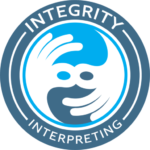Importance of Hiring a Certified Interpreter
WHAT IS IN IT FOR ME?
Hiring an American Sign Language Interpreter comes with tax benefits of which employers such as hospitals, businesses, and other organizations may not be aware. These tax benefits help to offset the costs of improving the working environment to be more accessible for patients and employees who are deaf or hard of hearing. In 1990, the Americans with Disabilities Act (ADA) was passed which strictly prohibits discrimination of any kind, and guarantees equal opportunity for persons with disabilities in the venues of employment, government services, public accommodations, and transportation access. It also expressly mandates TDD/telephone relay services. The following link explicates deductions and incentives with providing sign language interpreters user the ADA.
WHAT DOES THE AMERICANS WITH DISABILITY ACT SAY ABOUT USING INTERPRETERS?
The access to goods and services for those living with disabilities was emboldened by the Americans with Disabilities Act of 1990, allowing equal access for those with disabilities to those living without disabilities. Accommodation and enforcement of the ADA may be varied among businesses and government entities, though those businesses and entities may not be aware of the comprehensive nature of the statute, which guides in the compliance with the ADA. As recently as March, 2011, the ADA was amended to reflect the growing needs and concerns of those with disabilities. In accordance with the ADA, sign language interpreting, which helps deaf and hard of hearing people communicate, is often required by law. The ADA frequently demands the use of an American Sign Language (ASL) interpreter to meet the communication needs of deaf or hard of hearing persons.
SIGN LANGUAGE INTERPRETING & DISCRIMINATION LAW
The Americans with Disabilities Act states in section 504:
No individual shall be discriminated against on the basis of disability in the full and equal enjoyment of the goods, services, facilities, privileges, advantages, or accommodations of any place of public accommodation by any person who owns, leases (or leases to), or operates a place of public accommodation.
As defined, discrimination includes:
…a failure to take such steps as may be necessary to ensure that no individual with a disability is excluded, denied services, segregated or otherwise treated differently than other individuals because of the absence of auxiliary aids and services…
The ADA defines “auxiliary aids and services” in reference to deaf or hard of hearing individuals, “qualified interpreters or other effective methods of making aurally delivered materials available to individuals with hearing impairments.”
In this, the ADA requires the providing of sign language interpreters or other means of communication, which may include assistive listening devices for deaf or hard of hearing people in any place of public accommodation.
WHERE SIGN LANGUAGE INTERPRETING IS REQUIRED
The Americans with Disabilities Act clearly stipulates the theaters for which compliance is necessary. One such place is the hospital wherein the hospital must provide accessible means of communication to deaf or hard of hearing patients, family of patients, or visitors on the entirety of hospital property. ADA compliance to this may be written notes or, in the scenario of complex discussion regarding treatment or medical procedures, a qualified American sign Language (ASL) interpreter. Similarly, ADA compliance extends to legal, education, law enforcement, and employment settings. Job interviews with deaf or hard of hearing persons require ASL interpreting provided by the hiring company. Legal proceedings also require a qualified interpreter, covered by the ADA. Hotels as well must be compliant in providing accessible accommodations and teletypewriters to deaf or hard of hearing persons.
PENALTIES FOR NON-COMPLIANCE
The standards set by the Americans with Disabilities Act (ADA) require the individual institution to provide and pay for necessary sign language interpreting. The penalties for not complying with ADA standards to meet the needs of a deaf or hard of hearing individual may be very serious.
In 2008, a New Jersey doctor who refused to provide a sign language interpreter was sued by a deaf woman who had requested the interpreter several times. A jury ruled that the deaf woman was discriminated against, and unanimously ruled in favor of the woman, who received a $400,000 award. Source
Another such example found a lawsuit against retailer Wal-Mart in 2000 when two deaf persons needs were not met when applying for jobs at the store. In the settlement, Wal-Mart agreed to provide sign language interpreting to the individuals during job training, meetings, and job progress evaluations. Source
IT’S ALL ABOUT EFFECTIVE COMMUNICATION
In reference to deaf and hard of hearing persons, the Americans with Disabilities Act (ADA) uses the phrase “effective communication.” Though at times difficult to define, by law whatever is necessary for communication is required. Ultimately, sign language interpreting is the most effective and efficient way for businesses and institutions to comply completely with the ADA.

